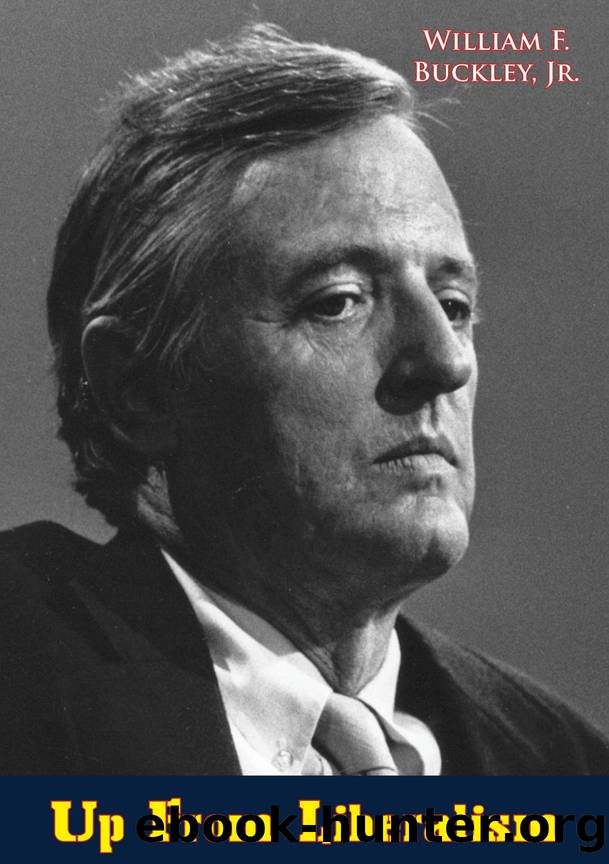Up From Liberalism by William F. Buckley Jr

Author:William F. Buckley Jr.
Language: eng
Format: epub
Publisher: Pickle Partners Publishing
Published: 2019-02-27T00:00:00+00:00
The LiberalâHIS ROOT ASSUMPTIONS
The Claims for Democracy
âThe people who make the revolution always seem to ask for liberty.â
âBut do they ever get it, Mr. Gumbril?â Mr. Bojanus cocked his head playfully and smiled. âLook at âistory, Mr. Gumbril look at âistory. First itâs the French Revolution. They ask for political liberty. And they gets it. Then comes the Reform Bill, then Forty-Fight, then all the Franchise Acts and Votes for Womenâalways more and more political liberty. And whatâs the results, Mr. Gumbril? Nothing at all. Whoâs freer for political liberty? Not a soul, Mr. Gumbril. There was never a greater swindle âatched in the âole of âistory. And when you think âow those poor young men like Shelley talked about itâitâs patheticâ said Mr. Bojanus, shaking his head, âreally pathetic!ââAntic Hay, by Aldous Huxley.
PROFESSOR RICHARD WEAVER HAS shrewdly observed that in recent years method has become the reigning absolute.{34} It used to be that subject matter had precedence over method. But modish philosophical systems, notably logical positivism, whose rise has coincided with and to a crucial extent made possible the rise of contemporary Liberalism by providing it with its metaphysical base, have effected a revolution. Method is kingâbecause things are ârealâ only in proportion as they are discoverable by the scientific method; with the result that method logically directs all intellectual (to which we now subordinate moral and metaphysical) traffic.
The consequences of the instrumental view of life and the transfer of attention from subject-matter to method are instantly apparent in various articles of the Liberal creed. Our preoccupation these days, as I indicated in the preceding chapter, is not so much with the kind of society democracy brings forth in a given political situation, as with democracy itself. We worry about how much academic freedom there is on this campus or that one, rather than about what is being done by the intellect-made-free. The talk is about education as a process, not about the goals of education: indeed we are not permitted to stipulate the goals of education except in methodological terms (education must teach one âhow toâ think, âhow toâ adjust, âhow toâ find happiness, etc.)âbecause it is heretical to conclude that education can have objective goals. Rather, it is for each student, exercising his Democratically-Guaranteed right of Academic Freedom to employ the Scientific Method to decide what is his truth.
Professor Ernest van den Haag, moving from premises very like Weaverâs, carries forward his observations to identify a central weakness of the democratic West in its quarrel with Communism.{35} The secular ideology of Liberalism, which sets the tone of contemporary Western thought, is no match for Communism because it is not a redemptive creed. The Communistsâ program is capable (at least for a period of time, until the illusion wears off) of being wholly satisfactory, emotionally and intellectually, to large numbers of people. The reason for this is that Communist dogma is eschatologically conceived. Communism promises the elimination of poverty, war, inequality, insecurity. Communism offers a view of human
Download
This site does not store any files on its server. We only index and link to content provided by other sites. Please contact the content providers to delete copyright contents if any and email us, we'll remove relevant links or contents immediately.
| Anarchism | Communism & Socialism |
| Conservatism & Liberalism | Democracy |
| Fascism | Libertarianism |
| Nationalism | Radicalism |
| Utopian |
The Secret History by Donna Tartt(19092)
The Social Justice Warrior Handbook by Lisa De Pasquale(12191)
Thirteen Reasons Why by Jay Asher(8912)
This Is How You Lose Her by Junot Diaz(6889)
Weapons of Math Destruction by Cathy O'Neil(6281)
Zero to One by Peter Thiel(5802)
Beartown by Fredrik Backman(5759)
The Myth of the Strong Leader by Archie Brown(5509)
The Fire Next Time by James Baldwin(5448)
How Democracies Die by Steven Levitsky & Daniel Ziblatt(5219)
Promise Me, Dad by Joe Biden(5154)
Stone's Rules by Roger Stone(5088)
A Higher Loyalty: Truth, Lies, and Leadership by James Comey(4964)
100 Deadly Skills by Clint Emerson(4927)
Rise and Kill First by Ronen Bergman(4790)
Secrecy World by Jake Bernstein(4753)
The David Icke Guide to the Global Conspiracy (and how to end it) by David Icke(4720)
The Farm by Tom Rob Smith(4514)
The Doomsday Machine by Daniel Ellsberg(4490)
